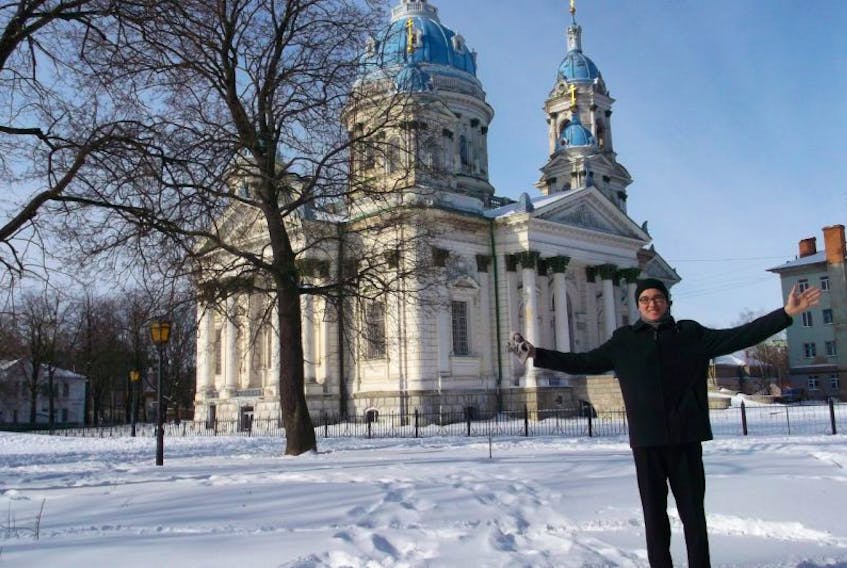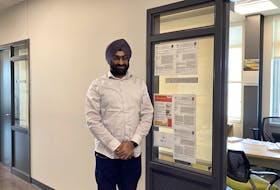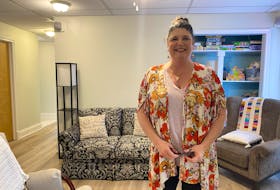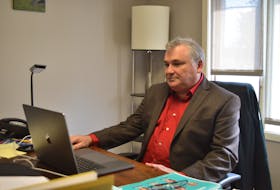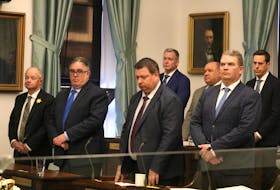The 20-year-old Edmonton man spent the last 16 months living in the eastern Ukrainian city of Donesk, working as a missionary with the Church of Jesus Christ of Latter Day Saints.
He and several other missionaries with the church were recently evacuated from that part of the country and recalled to the national capital of Kiev after the situation in Donesk became volatile.
McKenney was reassigned back to Canada and landed in Summerside about a week ago. He’ll be part of a team of missionaries working here for the next several months.
He’s glad to be here, he said, but the full experience of being in Ukraine during such major events is still sinking in.
“It was scary at times. I learned to love these people and I could see they were just trying to protect their homes. I prayed hard about a lot of things there, that everything would be alright,” said McKenney.
Ukraine has been rocked by internal disputes and outright invasion by the Russian Federation for months.
A massive protest movement started in central Ukraine in 2013 when the country’s leadership at the time dropped its efforts at closer ties with Western powers in favour of renewed ties with Russia.
The government eventually collapsed under the pressure and an interim, pro-Western, leadership was established.
This in turn caused outrage in the mostly pro-Russian eastern regions of Ukraine. The Crimea region, which had been semi-autonimous, eventually declared it was succeeding from the country and joining Russia, which then sent troops to secure the region.
Once Crimea was secured by Russia, other parts of Eastern Ukraine started to protest and speak of also succeeding.
Donesk, where McKenney was living through all this, became a centre for pro-Russian protests.
But unlike Crimea where the population was nearly entirely pro-Russia, McKenney said Donesk is more split in terms of loyalties.
He was there for more than a year, he said, and politics was the only thing anyone wanted to talk about.
“Whenever we’d try to bring up religion, they’d bring up government politics, so you’d always have to try and get around that,” he recalled.
Things were relatively quiet where he was living, he added, until the Crimea situation erupted. Then the protests started.
He and his missionary partner were walking along one of the city’s main streets one day when trucks full of pro-Russian protesters pulled up and started seizing government buildings.
The situation would go through phases after that, he said, with spats of deadly violence and protests giving way to relative calm.
“It was kind of uneasy with us and the people. We didn’t know when the next attacks would be or what else would happen,” he said.
“So that was kind of scary – just the uncertainty of what was going to happen.”
During all this, they continued their missionary work, though they took precautions to avoid conflict.
They tried to avoid the city centre, which is where most of the protests were focused, and any time they came across a large group of people they’d remove their nametags and avoid the crowd.
A few times they were put on lockdown at their residence, warned by their missionary office and church leaders not to leave their building.
Finally, about a month ago McKenney and other missionaries were pulled out of the region.
Since then, clashes between the Ukrainian military and armed pro-Russian groups in Donesk have killed dozens of people.
During his mission work, McKenney isn’t allowed to watch TV or plug into mass media, so it’s hard for him to keep up with the situation in Ukraine. But he doesn’t like what he hears through email and in conversation.
“It’s uneasy to hear, but I just hope everything will be OK. That’s really all I can do,” he said.
@JournalPMacLean
The 20-year-old Edmonton man spent the last 16 months living in the eastern Ukrainian city of Donesk, working as a missionary with the Church of Jesus Christ of Latter Day Saints.
He and several other missionaries with the church were recently evacuated from that part of the country and recalled to the national capital of Kiev after the situation in Donesk became volatile.
McKenney was reassigned back to Canada and landed in Summerside about a week ago. He’ll be part of a team of missionaries working here for the next several months.
He’s glad to be here, he said, but the full experience of being in Ukraine during such major events is still sinking in.
“It was scary at times. I learned to love these people and I could see they were just trying to protect their homes. I prayed hard about a lot of things there, that everything would be alright,” said McKenney.
Ukraine has been rocked by internal disputes and outright invasion by the Russian Federation for months.
A massive protest movement started in central Ukraine in 2013 when the country’s leadership at the time dropped its efforts at closer ties with Western powers in favour of renewed ties with Russia.
The government eventually collapsed under the pressure and an interim, pro-Western, leadership was established.
This in turn caused outrage in the mostly pro-Russian eastern regions of Ukraine. The Crimea region, which had been semi-autonimous, eventually declared it was succeeding from the country and joining Russia, which then sent troops to secure the region.
Once Crimea was secured by Russia, other parts of Eastern Ukraine started to protest and speak of also succeeding.
Donesk, where McKenney was living through all this, became a centre for pro-Russian protests.
But unlike Crimea where the population was nearly entirely pro-Russia, McKenney said Donesk is more split in terms of loyalties.
He was there for more than a year, he said, and politics was the only thing anyone wanted to talk about.
“Whenever we’d try to bring up religion, they’d bring up government politics, so you’d always have to try and get around that,” he recalled.
Things were relatively quiet where he was living, he added, until the Crimea situation erupted. Then the protests started.
He and his missionary partner were walking along one of the city’s main streets one day when trucks full of pro-Russian protesters pulled up and started seizing government buildings.
The situation would go through phases after that, he said, with spats of deadly violence and protests giving way to relative calm.
“It was kind of uneasy with us and the people. We didn’t know when the next attacks would be or what else would happen,” he said.
“So that was kind of scary – just the uncertainty of what was going to happen.”
During all this, they continued their missionary work, though they took precautions to avoid conflict.
They tried to avoid the city centre, which is where most of the protests were focused, and any time they came across a large group of people they’d remove their nametags and avoid the crowd.
A few times they were put on lockdown at their residence, warned by their missionary office and church leaders not to leave their building.
Finally, about a month ago McKenney and other missionaries were pulled out of the region.
Since then, clashes between the Ukrainian military and armed pro-Russian groups in Donesk have killed dozens of people.
During his mission work, McKenney isn’t allowed to watch TV or plug into mass media, so it’s hard for him to keep up with the situation in Ukraine. But he doesn’t like what he hears through email and in conversation.
“It’s uneasy to hear, but I just hope everything will be OK. That’s really all I can do,” he said.
@JournalPMacLean

